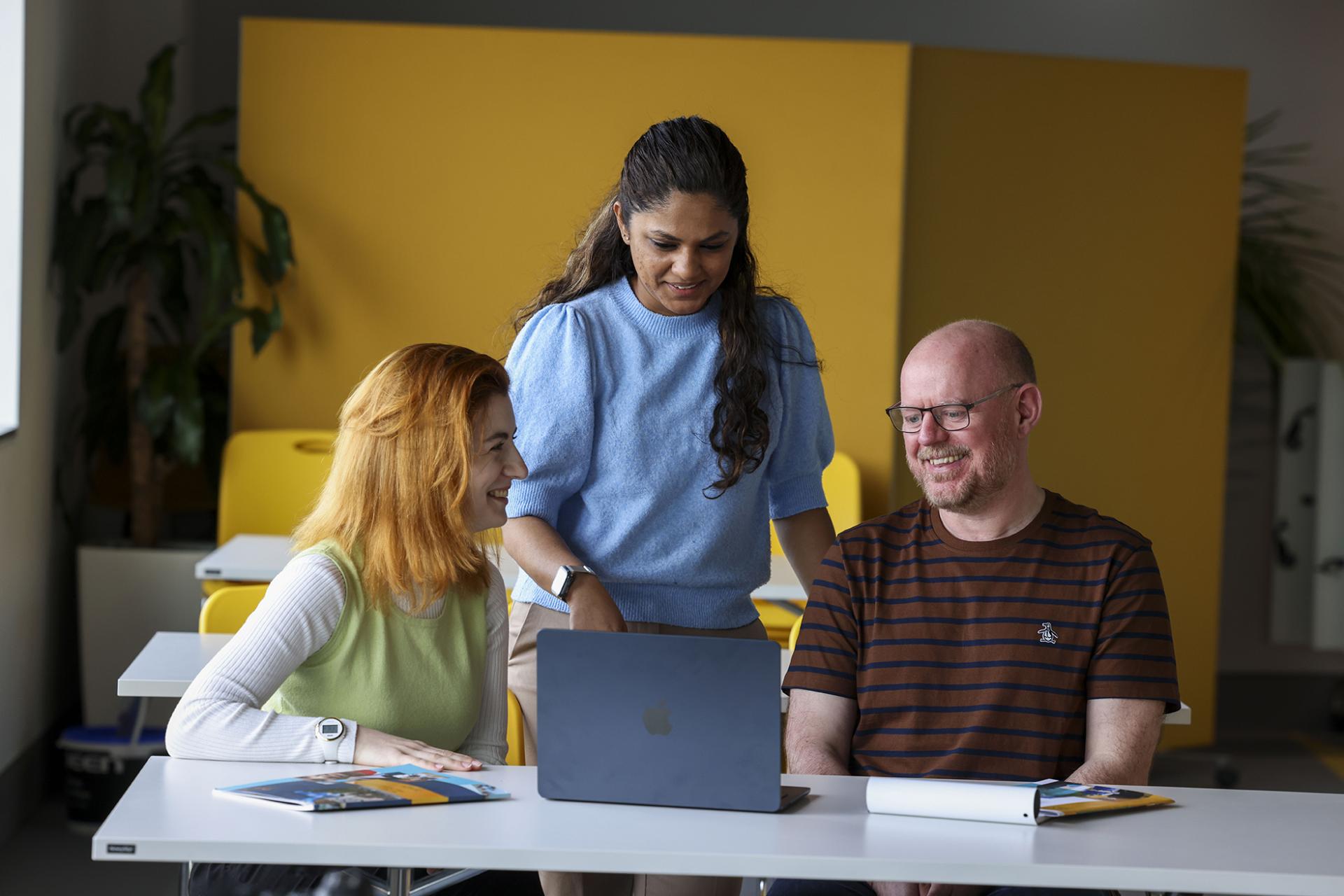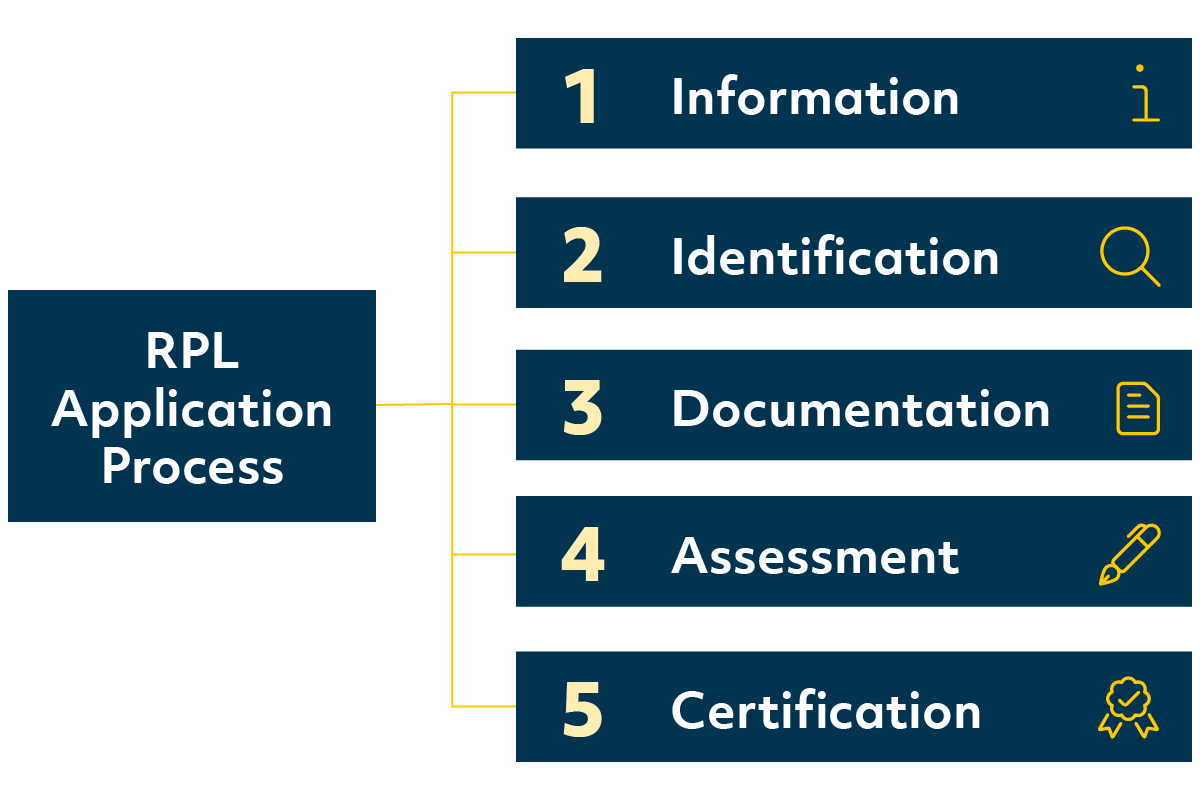

The RPL Process
Recognition of Prior Learning
What's involved in the RPL process?
The RPL process has different stages that must be followed because it is a method to identify, assess and formally recognise prior learning on the National Framework of Qualifications.
There are five steps in the RPL process. You are required to complete stages 1-3. Stages 4 and 5 are completed by academic staff in DCU. If you have any questions, need some of the terms explained or simply want to check whether you have included everything, please get in touch at rpl@dcu.ie.
The five stages are outlined below:

- Information: This is where you learn about RPL opportunities in a higher education institution and how the process works.
Read more
- Identification: Here, you are asked to explore your experiences and learning to date with a view to making an RPL application. This is also an opportunity for you to tell us about your learning - whether formal, informal, non-formal or a combination.
Read more
- Documentation: This is a reflective process where you gather relevant materials to support your application. Some materials may include a CV, job descriptions or a letter confirming your experience in a specific area of interest/expertise in your job. We can answer your questions about this stage at rpl@dcu.ie.
Read more
- Assessment: This is where your application is assessed. A range of assessment options, e.g., a portfolio, interviews, essays or auditions, may be used. Depending on the outcome of the assessment process, you will receive recognition of your learning or further information.
Read more
- Certification: If successful, you will receive formal recognition (i.e. an acknowledgement), which can lead to entry to a programme, entry to advanced years of the programme and/or exemption from some programme modules.
Read more
1. Information:
Do you know what you are interested in studying? Is there an area you are passionate about in terms of interests or existing experience? Maybe you are looking to enhance your career options. By reading this, you have already begun to learn more about the RPL process. If you are unsure of what you want to study, it is good to research possible programmes you may be interested in.
More information about programmes in DCU can be found here: List of courses at DCU. Chat functions are also available on programme pages, which may help you find more information.
If you are looking at a possible career change or are interested in a programme not directly related to your current field, remember DCU and employers all attach great value to transferable skills. DCU is learner-centred and deeply understands the evolving needs of different industries. We also understand that nearly every job will change. RPL supports this cycle of entry and re-entry across all capabilities.
If you have questions around career guidance and best options such as ‘am I choosing the right programme with my existing learning’ or ‘I am not sure which course is best for me,’ then send us a query here. We are here to help and answer questions.
2. Identification
This stage is about identifying the entry requirements, or the learning outcomes, of a module and considering them in relation to what you already know - remember your existing knowledge can be informal as well as from formal learning or perhaps a combination of both.
Where can I find information about RPL requirements in DCU?
If you find a programme that interests you, the next step is to go to the programme webpage. There, you will find information about all entry routes as well as career options. If the programme offers RPL for entry, it will specify further details under ‘course entry requirements’.
How do I know I have knowledge and experiences relevant to the programme?
Go to the programme webpage to help identify if you have existing knowledge or experience that could be suitable for RPL certification. You will find further information about the content under ‘about’ and ‘programme’. Ask yourself the following questions:
- Do I already know anything about this programme?
- Do I have past experiences in life or work related to this?
- Consider your previous jobs. What did you learn from them?
- Is there a specific career path that you would like to follow?
- Does this programme accept RPL applications?
As you see where your existing learning can have further application or use in DCU, you can contact the programme chair, whose contact details are on the programme website. He/she will be able to advise you on your eligibility for entry based on RPL.
If you cannot locate the programme personnel for a response to your query, please contact DCU’s RPL team at rpl@dcu.ie.
3. Documentation
This is a particularly important part of the RPL assessment process. It is where you have the chance to provide documents and materials to support your application to DCU for recognition of prior learning. The programme chairs will specify the types of documentation to be provided. You should present your existing learning in the context of what the course or programme you are interested in requires.
Supporting documents include transcripts, official syllabi, your CV, and an outline of educational/training courses you have completed at work or in your own time as part of your education journey. References will also help document your evidence for RPL.
We realise that tailoring your previous learning to the learning outcomes of a programme or module you seek to use RPL for can be difficult, so we hope the following information will help.
Examples of evidence to support your learning
| Types of learning | Description of learning | Examples of evidence | What your evidence may include |
|---|---|---|---|
| Formal learning | Organised programmes or courses of study that offer awards or credits |
|
|
| Non-formal learning | Planned and structured programmes that do not lead to a certified qualification |
|
|
| Informal learning | Acquired through life and work experience |
|
|
Note: If there is no tangible evidence of your learning, it may be possible to arrange verification from third parties/employers/managers. This may include letters of verification, references and records from HR departments.
In addition, your RPL application may require that you do one or more of the following:
- Submit a portfolio of evidence
- Attend an interview with programme assessors
- Undertake a practical exercise/audition
- Complete a piece of written work
4. Assessment
The assessment process and what it involves will reflect the course requirements you are interested in/have made your RPL application for. This can include an interview, portfolio, essay, and/or an audition. Your application will subsequently be examined by an expert in the subject or a panel of experts.
How is my application assessed?
RPL assessment will take the following into account:
- Currency of knowledge
- Your career goals and availability
- Equivalence of learning to the DCU credit to be granted
- Module learning outcomes
- Content and assessment approaches of your previous experiences
What is the assessor looking for?
The assessor is looking to see that each learning outcome is met at a pass or basic level, and that the learning presented is yours. They will require evidence of your prior learning. The assessor will want to be certain that you met each learning outcome at a pass or basic level and that the evidence/documentation to support this relates to you.
5. Certification
The final stage of the process is the outcome. If your application is successful, you will receive formal recognition or acknowledgement. You may also receive feedback and advice.
For more information on how to make a formal RPL application, please visit How To Apply.
